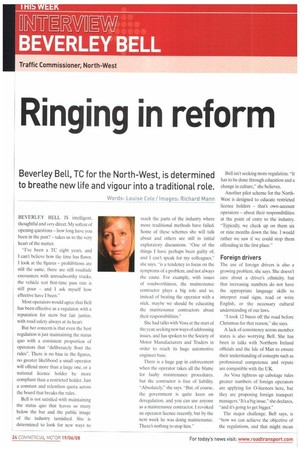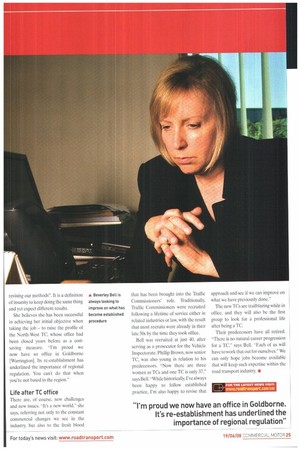Ringing in reform
Page 24

Page 25

If you've noticed an error in this article please click here to report it so we can fix it.
Beverley Bell, IC for the North-West, is determined to breathe new life and vigour into a traditional role.
Words: Louise Cote/ images: Richard Mann BEVERLEY BELL IS intelligent, thoughtful and very direct. My softest of opening questions how long have you been in the post? takes us to the very heart of the matter.
"I've been a TC eight years, and I can't believe how the time has flown. I look at the figures prohibitions are still the same, there are still roadside encounters with unroadworthy trucks, the vehicle test first-time pass rate is still poor and I ask myself how effective have I been."
Most operators would agree that Bell has been effective as a regulator, with a reputation for stern but fair justice, with road safety always at its heart.
But her concern is that even the best regulation is just maintaining the status quo with a consistent proportion of operators that "deliberately flout the rules-. There is no bias in the figures, no greater likelihood a small operator will offend more than a large one, or a national licence holder be more compliant than a restricted holder. Just a constant and relentless quota across the board that breaks the rules.
Bell is not satisfied with maintaining the status quo that leaves so many below the bar and the public image of the industry tarnished. She is determined to look for new ways to reach the parts of the industry where more traditional methods have failed. Some of these schemes she will talk about and others are still in initial exploratory discussions. "One of the things I have perhaps been guilty of, and I can't speak for my colleagues," she says, "is a tendency to focus on the symptoms of a problem, and not always the cause. For example, with issues of roadworthiness. the maintenance contractor plays a big role and so, instead of beating the operator with a stick, maybe we should be educating the maintenance contractors about their responsibilities."
She had talks with Vosa at the start of the year. seeking new ways of addressing issues, and has spoken to the Society of Motor Manufacturers and Traders in order to reach its huge automotive engineer base.
There is a huge gap in enforcement when the operator takes all the blame for faulty maintenance procedures, but the contractor is free of liability. "Absolutely," she says. "But, of course, the government is quite keen on deregulation, and you can use anyone as a maintenance contractor. I revoked an operator licence recently, but by the next week he was doing maintenance. There's nothing to stop him." Bell isn't seeking more regulation. "It has to be done through education and a change in culture," she believes.
Another pilot scheme for the NorthWest is designed to educate restricted licence holders that's own-account operators about their responsibilities at the point of entry to the industry. "Typically, we check up on them six or nine months down the line. I would rather we saw if we could stop them offending in the first place."
Foreign drivers
The use of foreign drivers is also a growing problem, she says. She doesn't care about a driver's ethnicity, but that increasing numbers do not have the appropriate language skills to interpret road signs, read or write English, or the necessary cultural understanding of our laws.
"I took 12 buses off the road before Christmas for that reason," she says.
A lack of consistency across member states is also worrying Bell. She has been in talks with Northern Ireland officials and the Isle of Man to ensure their understanding of concepts such as professional competence and repute are compatible with the UK.
As Vosa tightens up cabotage rules greater numbers of foreign operators are applying for 0-licences here, but they are proposing foreign transport managers." It's a big issue,she declares, "and it's going to get bigger."
The major challenge, Bell says, is "how we can achieve the objective of the regulations, and that might mean revising our methods". It is a definition of insanity to keep doing the same thing and yet expect different results.
She believes she has been successful in achieving her initial objective when taking the job to raise the profile of the North-West TC, whose office had been closed years before as a costsaving measure. "I'm proud we now have an office in Goldborne (Warrington]. Its re-establishment has underlined the importance of regional regulation. You can't do that when you're not based in the region."
Life after TC office There are, of course, new challenges and new issues. -It's a new world," she says, referring not only to the constant commercial changes we see in the industry but also to the fresh blood that has been brought into the Traffic Commissioners' role. Traditionally, Traffic Commissioners were recruited following a lifetime of service either in related industries or law, with the result that most recruits were already in their late 50s by the time they took office.
Bell was recruited at just 40, after serving as a prosecutor for the Vehicle Inspectorate. Phillip Brown, now senior TC, was also young in relation to his predecessors. "Now there are three women as Ts and one TC is only 37," says Bell. "While historically, I've always been happy to follow established practice. I'm also happy to revise that approach and see if we can improve on what we have previously done."
The new TCs are trailblazing while in office, and they will also be the first group to look for a professional life after being a TC.
Their predecessors have all retired. "There is no natural career progression for a TC," says Bell. "Each of us will have to work that out for ourselves." We can only hope jobs become available that will keep such expertise within the road transport industry. •
FOS THE LATEST NEWS VISIT:
www.roadtransport.com/cm
















































































































































































































